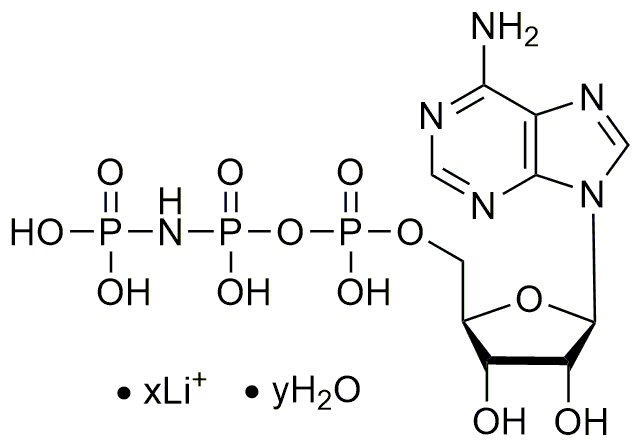Adenosine-5'-(b,g-imido)triphosphate lithium salt hydrate is widely utilized in research focused on:
- Biochemical Research: This compound serves as a potent ATP analog, allowing researchers to study energy transfer and metabolic processes in cells, which is crucial for understanding cellular functions and disease mechanisms.
- Enzyme Activity Studies: It is commonly used to investigate the kinetics of various enzymes, particularly those involved in phosphorylation reactions, helping scientists to uncover enzyme mechanisms and potential inhibitors.
- Pharmaceutical Development: The compound plays a significant role in drug discovery, particularly in developing therapeutics targeting energy metabolism disorders, providing insights into potential treatments.
- Cell Signaling Research: Researchers utilize it to explore signal transduction pathways, enhancing our understanding of how cells communicate and respond to external stimuli, which is vital for developing targeted therapies.
- Biotechnology Applications: Its use in biotechnological processes, such as the optimization of fermentation and metabolic engineering, helps improve yields in industrial applications, offering a competitive edge in production efficiency.
General Information
Properties
Safety and Regulations
Applications
Adenosine-5'-(b,g-imido)triphosphate lithium salt hydrate is widely utilized in research focused on:
- Biochemical Research: This compound serves as a potent ATP analog, allowing researchers to study energy transfer and metabolic processes in cells, which is crucial for understanding cellular functions and disease mechanisms.
- Enzyme Activity Studies: It is commonly used to investigate the kinetics of various enzymes, particularly those involved in phosphorylation reactions, helping scientists to uncover enzyme mechanisms and potential inhibitors.
- Pharmaceutical Development: The compound plays a significant role in drug discovery, particularly in developing therapeutics targeting energy metabolism disorders, providing insights into potential treatments.
- Cell Signaling Research: Researchers utilize it to explore signal transduction pathways, enhancing our understanding of how cells communicate and respond to external stimuli, which is vital for developing targeted therapies.
- Biotechnology Applications: Its use in biotechnological processes, such as the optimization of fermentation and metabolic engineering, helps improve yields in industrial applications, offering a competitive edge in production efficiency.
Documents
Safety Data Sheets (SDS)
The SDS provides comprehensive safety information on handling, storage, and disposal of the product.
Product Specification (PS)
The PS provides a comprehensive breakdown of the product’s properties, including chemical composition, physical state, purity, and storage requirements. It also details acceptable quality ranges and the product's intended applications.
Certificates of Analysis (COA)
Search for Certificates of Analysis (COA) by entering the products Lot Number. Lot and Batch Numbers can be found on a product’s label following the words ‘Lot’ or ‘Batch’.
*Catalog Number
*Lot Number
Certificates Of Origin (COO)
This COO confirms the country where the product was manufactured, and also details the materials and components used in it and whether it is derived from natural, synthetic, or other specific sources. This certificate may be required for customs, trade, and regulatory compliance.
*Catalog Number
*Lot Number
Safety Data Sheets (SDS)
The SDS provides comprehensive safety information on handling, storage, and disposal of the product.
DownloadProduct Specification (PS)
The PS provides a comprehensive breakdown of the product’s properties, including chemical composition, physical state, purity, and storage requirements. It also details acceptable quality ranges and the product's intended applications.
DownloadCertificates of Analysis (COA)
Search for Certificates of Analysis (COA) by entering the products Lot Number. Lot and Batch Numbers can be found on a product’s label following the words ‘Lot’ or ‘Batch’.
*Catalog Number
*Lot Number
Certificates Of Origin (COO)
This COO confirms the country where the product was manufactured, and also details the materials and components used in it and whether it is derived from natural, synthetic, or other specific sources. This certificate may be required for customs, trade, and regulatory compliance.


